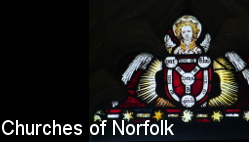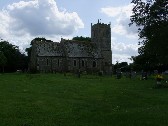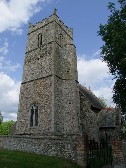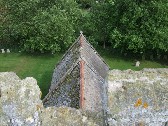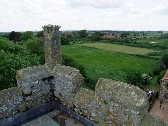| |
|
All
Saints, Boughton
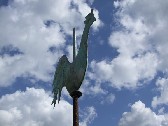 |
|
Living
in Ipswich as I do, and not driving, I find it
easier to get into some parts of Norfolk than
others, which is why the bulk of the churches
remaining to be visited by the Norfolk Churches
Site are on the western side of the county.
Occasionally, and quite understandably, Rectors,
churchwardens and members of congregations get
impatient with this. Some of them are politer
than others. Back in April, Peter Agate wrote to
me: May we
invite you to our beautiful village of Boughton
and All Saints Church? It would be lovely
to have our church added to your interesting and
well presented website. Well, how could I refuse? David
Striker and I headed up from Brandon on a late
spring day which had started very wet, but which
was beginning to blossom at last. Boughton is one
of those pretty little villages which cluster
about the rather more agro-industrial larger
village of Stoke Ferry in south-west Norfolk.
Like the other two, Wereham and Wretton, Boughton
has cottages around a lovely village green and a
pond. Sam Mortlock thinks that Boughton's pond is
the best of all in Norfolk, and I was inclined to
agree.
|
All Saints
church is typical of hundreds of small English churches
which have got on with the business of being the
spiritual touchstones of their parishes for hundreds and
hundreds of years. There is no Big House here, no Big
Family to keep their firm hand on the tiller, and so the
building has been carried gently through the centuries by
local people, touched lightly on a fairly regular basis,
and occasionally radically restructured when theological
enthusiasm or iconoclasm intervened. Thus, we have a
building which is almost all of its 1872 restoration,
which was essentially a rebuilding. But the tower
survives from Catholic days, and seems to have been only
lightly restored by the Victorians.
Unlike the
churches at Wretton and Wereham, we found this church
locked. There is a keyholder notice, although it must be
said that the kind lady who came to open up seemed rather
surprised that anyone should want to see inside. It is
true, there is nothing remarkable here, but it is really
impossible to get a true flavour of a village without
seeing inside its parish church. Conversely, if a parish
keeps its church locked without a keyholder notice, it
tells you an awful lot about that village.
And, in
fact, there is one thing of great interest. This is a
small window in the nave depicting Christ as the Good
Shepherd and the Light of the World in a bold and yet
contemplative style, which I found difficult to date. It
seems too late for the date of the restoration, and yet
it has no memorial inscription, and no maker's mark as
far as I could see. Perhaps it may be from the early 20th
Century?
| The
nice lady, reasoning by now that David and I were
relatively harmless, wondered if we would like to
go up the tower and see the view. Now, I have a
terrible fear of heights, but I always accept
these offers on the grounds that it might one day
cure me (I once described this hope on these
pages as 'kill or cure', but realised quickly
that this was not what I meant at all). If I had known how precarious the
bell floors and ladders were I might have turned
her down, but by the time I had decided that I
definitely wasn't safe I was already out in the
open, up on the top. The wind blew straight out
of Cambridgeshire, and I clung on to the
lightning rod for fear of being cast over the low
parapet. Fine views, but not much of interest in
the way of landmarks, apart from the sugar beet
factory at Wissington. And then, the same hideous
journey back down to safety.
|
|
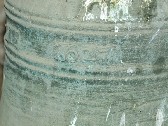 |
|
|
|
